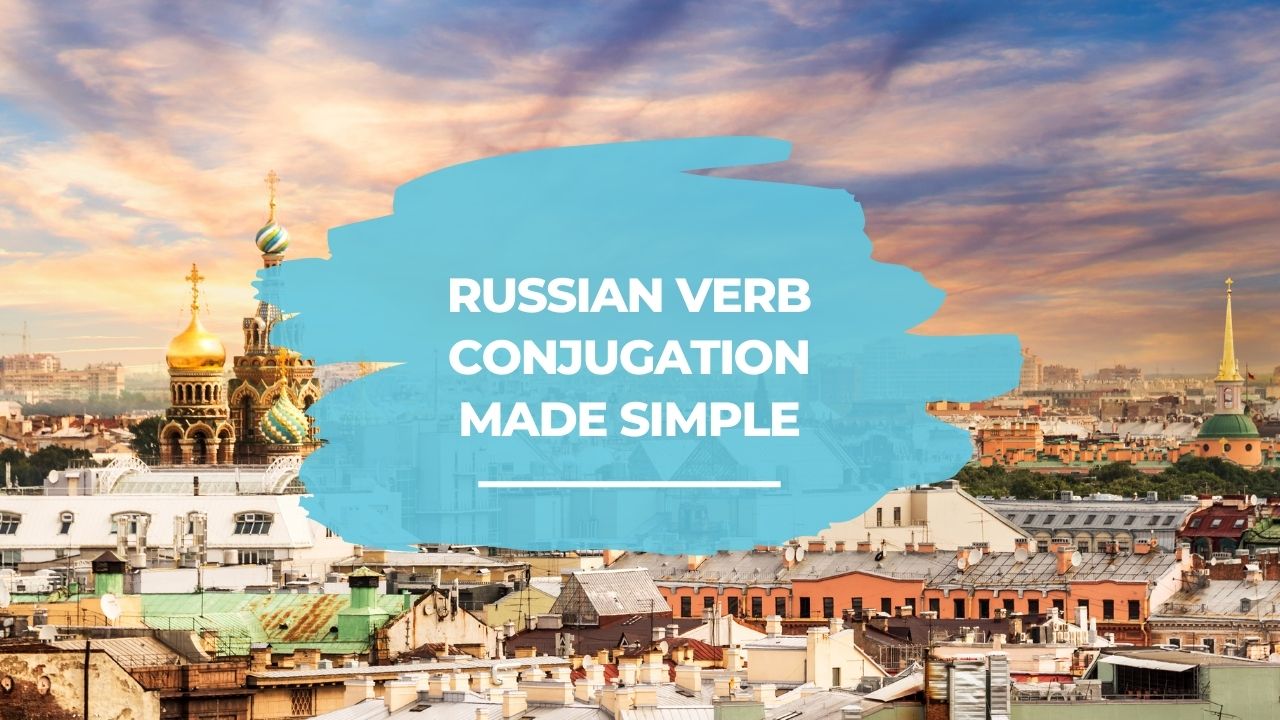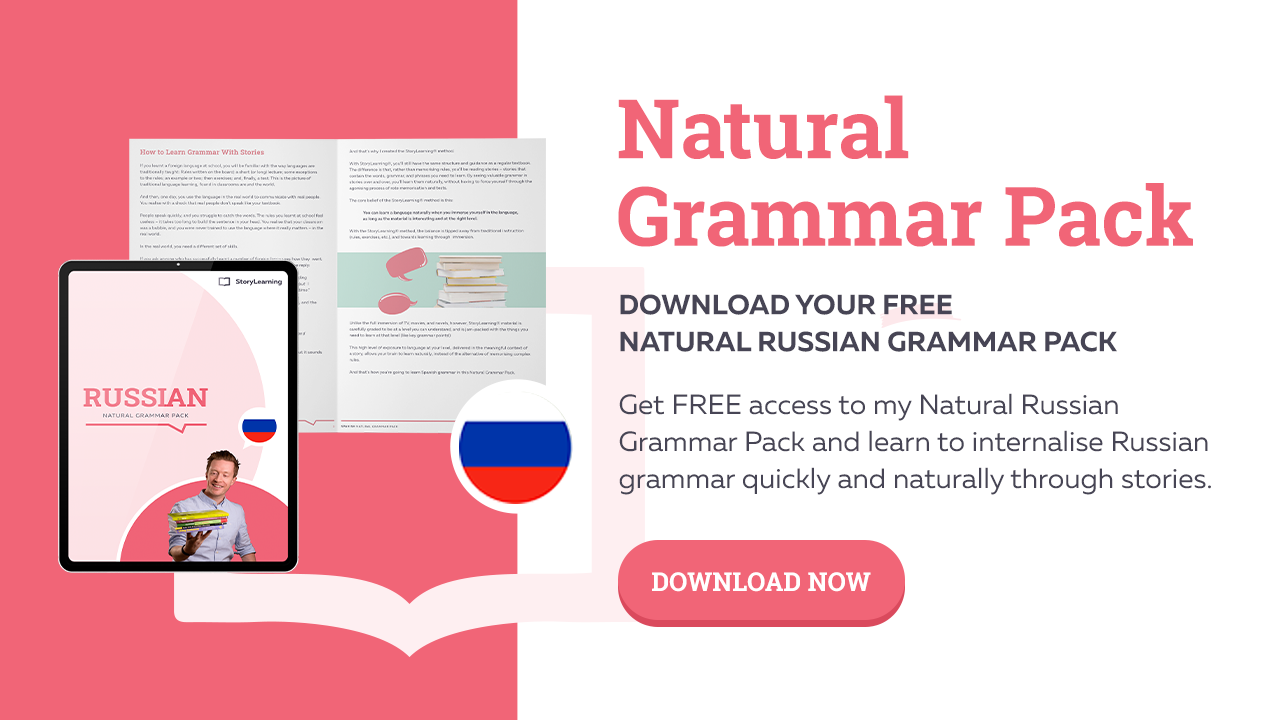
When you first start learning Russian, Russian verbs can look a bit hard to understand and even more difficult to master.
Although Russian verbs conjugate according to person and number, the actual forms are a lot easier to learn than you might think.
And that’s why this article is going to be all about getting comfortable with Russian verb conjugation.
By the end of the article you should have a broad understanding of:
- What verb conjugation is
- Russian verb conjugation rules
- The Russian verb conjugation groups
- How to conjugate the most important verbs in Russian
- The irregular Russian verbs
So let's get started.
By the way, if you want to learn Russian fast and have fun, my top recommendation is Russian Uncovered which teaches you through StoryLearning®.
With Russian Uncovered you’ll use my unique StoryLearning® method to learn Russian through story… not rules. It’s as fun as it is effective. If you’re ready to get started, click here for a 7-day FREE trial.
So….What Is Russian Verb Conjugation?

So by this point, you might be asking ‘what is verb conjugation’ and more importantly ‘what is Russian verb conjugation?’
To put it simply, conjugation is how a verb changes to “match” with the person doing an action. In English, we have a very narrow version of conjugation with only the third person singular (he/she/it) changing.
- I want to rest
- He want-s to rest
- We want to rest
The presence or absence of the -s is all that remains of English conjugation. Although this used to be much bigger in the days of Milton and Shakespeare.
- I play
- Thou play-est
- He play-eth
So verb conjugation is making sure that the ending of a verb matches its subject. If you’ve studied languages like French, Spanish, or German, then you’ve already seen plenty of this.
But what is Russian verb conjugation?
In Russian, verbs conjugate for six different forms. This pattern goes according to the person/thing doing the action and how many there are. Or in other words, you need to change the verb according to these subjects.
| Singular | Plural | |
| 1st person | я (I) | мы (we) |
| 2nd person | ты (you) | вы (you polite, you plural) |
| 3rd person | он/она/оно (he/she/it) | они (they) |
Why Is Conjugation So Important In Russian?
So now that you know what Russian conjugation is, you should know what makes it so important. In English we usually have to put the subject of the sentence before the verb. If you don’t things get a bit awkward.
- I’m going home vs. Am going home I*
- She sings quite well vs. Sings quite well*
However, Russian has a totally different take on what verbs and subjects do. And because of noun cases, Russian has a much more free word order than English.
Sometimes the verb that comes with a subject may come later in a phrase. In the two examples below, the subject and verb stand apart from each other.
- Я тебя не вижу (I don’t see you)
- Я письмо пишу (I’m writing a letter)
However, that’s just when the subject is actually used. Very often the subject of Russian sentences won’t be stated explicitly. In the next example, the subject ты is absent entirely. However we know that говоришь (you utter) refers to “you” because the verb ends in -шь.
- Только говоришь слово (You just say the word)
You can’t understand who’s doing the action without understanding the verb ending. So understanding verb conjugation in Russian is absolutely essential to really mastering the language.

How To Conjugate A Russian Verb
While there’s no way to get around learning Russian verb conjugation, it’s not as hard as you might first think, despite what the grammar villain is trying to convince you of!
There’s good news and there’s bad news here about Russian verb conjugation rules.
The good news is that that last part of the conjugation remains very predictable. There are only six endings to learn and they are very, very consistent throughout the language.
That means that if you see a verb ending in -шь, you can be sure that the subject is “you”. Likewise, when you see a verb ending in -м, you know that it means “we”.
| Singular | Plural | |
| 1st person | -у/-ю | -м |
| 2nd person | -шь | -те |
| 3rd person | -т | -ут/-ют/-ат/-ят |
So then, what’s the bad news?
While the final endings are consistent, the connecting letters for verbs can take some time to master. The real trick of conjugating a verb in Russian is to find its stem and to use the right connecting letter. Once you have that, you attach these endings and you’re done. The problem is how.
The majority of verbs end in -ть in their infinitive. And while knowing the infinitive of a verb is great, you can’t rely on it to get the stem.
So to know how to make every form of a verb you should learn:
- The infinitive form
- The я form
- The ты form
- The они form
And this becomes a lot easier when you realize that Russian verbs fall into a few groups. And learning these makes it much easier to conjugate verbs in Russian.

Conjugation Groups In Russian

Traditionally, teachers and textbooks will tell you that there are two verb conjugations in Russian.
And this isn’t wrong, but it’s probably better to say that there are two large categories of Russian verb conjugations, with a few subcategories tucked inside.
Russian First Conjugation
The first conjugation (первое спряжение) is sometimes called the -е/ё group. The reason is simple. Often with the first group, the connecting letter is either -е or -ё followed by the expected endings.
| 1st singular (я) | -ю | -у |
| 2nd singular (ты) | -ешь | -ёшь |
| 3rd singular (он/она/оно) | -ет | -ёт |
| 1st plural (мы) | -ем | -ём |
| 2nd plural (вы) | -ете | -ёте |
| 3rd plural (они́) | -ют | -ут |
You can identify these by their endings. The majority of these verbs end in
-ать, -оть, -уть, -ять, -ыть, -ти, -чь. There are also a few verbs that end in -ить that fall into this first group.
To conjugate them, you need to add the right endings onto the stem of the verb. For many first conjugation verbs, you can find the stem by removing -ть or -ти from the infinitive.
- Infinitive > Stem > Я Form
- Спрягать > спряга > спрягаю (I conjugate)
- Гулять > гуля > гуляю (I walk)
- Болеть > боле > болею (I’m ill)
- Идти > ид > иду (I go)
However for some verbs, the stem can be quite different from the infinitives. For verbs like жить (to live) and писать (to write) you have to learn the stem separately.
- Писать > пиш- > пишу (I write)
- Жить > жив- > живу (I live)
| 1st singular (я) | спрягаю | болею | живу |
| 2nd singular (ты) | спрягаешь | болеешь | живёшь |
| 3rd singular (он/она/оно) | спрягает | болеет | живёт |
| 1st plural (мы) | спрягаем | болеем | живём |
| 2nd plural (вы) | спрягаете | болеете | живёте |
| 3rd plural (они́) | спрягают | болеют | живут |
Russian Second Conjugation
The second verb conjugation in Russian (второе спряжение) is а bit easier to manage. Almost all verbs with infinitives that end in -ить belong to this group. They have the following endings.
| 1st singular (я) | -ю | -у |
| 2nd singular (ты) | -ишь | -ишь |
| 3rd singular (он/она/оно) | -ит | -ит |
| 1st plural (мы) | -им | -им |
| 2nd plural (вы) | -ите | -ите |
| 3rd plural (они́) | -ят | -ат |
While you can often (but not always) find the stem of verbs in the first conjugation by removing the letters ть, you more often have to take off ть, as well as the connecting vowel for the second conjugation.
- Infinitive > Stem Я > Form
- говорить > говор- > говорю (I speak)
- Молчать > молч- > молчу (I am silent)
- Лететь > лет- > лечу (I fly)
- Стоять > сто- > стою (I stand)
| 1st singular (я) | говорю | молчу | лечу |
| 2nd singular (ты) | говоришь | молчишь | летишь |
| 3rd singular (он/она/оно) | говорит | молчит | летит |
| 1st plural (мы) | говорим | молчим | летим |
| 2nd plural (вы) | говорите | молчите | летите |
| 3rd plural (они́) | говорят | молчат | летят |
The Weird Stem Group
There’s also a group of Russian that appear a bit differently. Really, they belong to the first conjugation, but they have stems that are shorter than you’d expect and insert the letter -у before the verb endings.
These verbs almost always end in -овать or -евать and the majority of them are loan words, often from Latin, French, German, or English
- Infinitive > Stem > Я Form
- Гарантировать > гарантир- > гарантирую (I guarantee)
- Танцевать > танц- > танцевую (I dance)
- Экспортировать > экспортир- > экспортирую (I export)
- Путешествовать > путешеств- > путешествую (I travel)
| 1st singular (я) | экспортирую | танцую |
| 2nd singular (ты) | экспортируешь | танцуешь |
| 3rd singular (он/она/оно) | экспортирует | танцует |
| 1st plural (мы) | экспортируем | танцуем |
| 2nd plural (вы) | экспортируете | танцуете |
| 3rd plural (они́) | экспортируют | танцуют |
Sound Changes In Verb Conjugation In Russian
While the endings of verbs might be regular, their connecting letters aren’t always. You may have noticed Russian’s tendency to “soften” certain consonants like близкий becoming ближе or короткий becoming короче.
And this “softening” happens with verbs as well. Letters like ст, д, з, т, г, and к often change in the different forms of the verb. This means that sometimes the я and/or они form of a word can have a different stem than the other forms.
| Мочь (can, to be able) | |
| 1st singular (я) | могу |
| 2nd singular (ты) | можешь |
| 3rd singular (он/она/оно) | может |
| 1st plural (мы) | можем |
| 2nd plural (вы) | можете |
| 3rd plural (они́) | могут |
These sound changes might cause the я and они to have a different stem, or just one of them. So let’s look at several verbs like in comparison. For мочь (can) and лечь (lie), both the я and они forms have different stems than the rest.
However, for the verbs видеть (to see) and грузить (to load), only the я form uses a different stem. This happens according to Russian sound changes. And while this may seem confusing, these sound changes are somewhat regular.
| мочь | лечь | видеть | грузить | |
| 1st singular (я) | могу | лягу | вижу | гружу |
| 2nd singular (ты) | можешь | ляжешь | видшь | грузишь |
| 3rd singular (он/она/оно) | может | ляжет | видит | грузит |
| 1st plural (мы) | можем | ляжем | видим | грузим |
| 2nd plural (вы) | можете | ляжете | видите | грузите |
| 3rd plural (они́) | могут | лягут | видят | грузят |
The Irregular Russian Verbs
Finally we come to the irregular verbs of Russian. And thankfully, there aren’t that many. In fact, the Russian language has only four verbs they call разноспрягаемые глаголы (differently conjugated) that have irregular conjugations that you’ll have to learn separately.
The verbs хотеть (to want) and бегать (to run) take their conjugations from both the first and second conjugation and aren’t too difficult to learn.
The verbs есть (to eat) and дать (to give) however, come from Old Slavonic and have verb forms that are somewhat archaic and unpredictable.
| Есть | дать | хотеть | бегать | |
| 1st singular (я) | ем | дам | хочу | бегу |
| 2nd singular (ты) | ешь | дашь | хочешь | бежишь |
| 3rd singular (он/она/оно) | ест | даст | хочет | бежит |
| 1st plural (мы) | едим | дадим | хотим | бежим |
| 2nd plural (вы) | едите | дадите | хотите | бежите |
| 3rd plural (они́) | едят | дадут | хотят | бегут |
More Good News For Russian Learners
Russian verb conjugation can be a lot to take in, but there’s good news to be had. Once you familiarize yourself with a verb’s conjugation, you can use it for any word derived from it, which will make learning so much easier.
So if you’ve learned the conjugation for идти or дать, then you already know the conjugation for dozens of other words that come from them. That means, you can quickly build on what you know instead of learning a new set.
And since the Russian language forms words like this often, you can use this to familiarize yourself with a lot of verb forms in a very short time.
Russian Verb Conjugation Practice: Keep On Immersing Yourself

Russian verb conjugation can be challenging if you’ve never dealt with it, but there is quite a lot of regularity to it.
Just remember to keep immersing yourself in Russian, with a fun and effective method like StoryLearning® and changing verbs into the right form will become second nature. These 8 Russian books for beginners will be a great starting point for Russian verb conjugation practice through immersion in stories.
While it’s going to take a while to fully master the Russian conjugation system, this article should give you a good start.
So now you should have a solid of idea of:
- Russian verb endings
- How to conjugate Russian verbs
- The two main verb conjugations in Russian
- Russian’s four irregular verbs
- Sound changes in Russian verbs
Until next time. And as always Удача из удач! (Best of luck!)







































